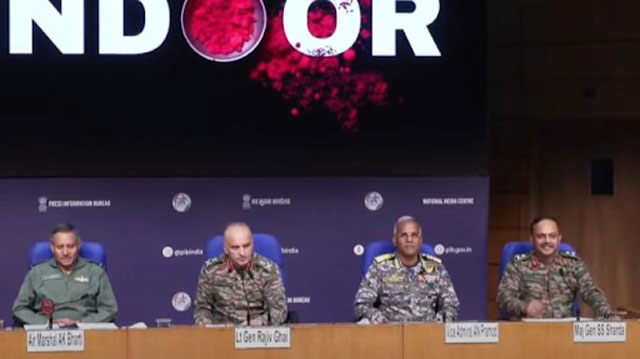Daijiworld Media Network – New Delhi
New Delhi, May 11: In one of the most comprehensive retaliatory military responses in recent years, India has launched targeted and multi-domain strikes against Pakistan’s military and terror infrastructure, resulting in the deaths of over 100 terrorists and 35–40 Pakistani soldiers.
The operations, conducted between May 7 and May 10, were in response to a series of cross-border provocations and culminated after the Pahalgam terror attack on April 22 that claimed 26 innocent lives.
Addressing a joint press briefing in New Delhi on Sunday, Director General of Military Operations (DGMO) Lt Gen Rajiv Ghai confirmed that Indian artillery and small arms fire along the Line of Control (LoC) neutralised 35 to 40 Pakistani military personnel.



“Between May 7 and 10, Pakistani positions saw calibrated firepower. Some of their airfields and ammunition dumps also faced attacks in waves from the air, all of which were thwarted by our systems,” he said.
At the same briefing, Air Marshal A K Bharti provided details of Pakistan’s coordinated aerial attempts to target Indian military assets, which failed due to India’s robust air defence.
“Beginning 8 pm on May 8, Pakistan launched multiple drones, unmanned systems, and combat vehicles in a synchronised attack on Indian Air Force installations in Jammu, Udhampur, Pathankot, Amritsar, Bathinda, Dalhousie, and Jaisalmer,” said Bharti.
“These incursions came in near-simultaneous waves and were all neutralised by alert air defence crews using both modern systems and legacy platforms such as Pechora and SAMAR. There was no damage on ground,” Bharti said.
In response, the Indian Air Force swiftly executed a calibrated counter-strike on Pakistani military bases and logistics hubs. “A decision was taken to strike where it would hurt,” said Bharti, naming the targeted locations as Chaklala, Rafiq, Rahim Yar Khan, Sargodha, Bhulari, and Jacobabad. “We have the capability to target every system at these bases and more,” he affirmed.
The backbone of India’s counter-offensive was Operation Sindoor, launched in direct response to the April 22 Pahalgam attack, which Lt Gen Ghai described as “brutal and dastardly”. “When we considered the horror of Pahalgam and other recent attacks on our armed forces and civilians, it became clear the time had come to make a compelling statement of national resolve,” he said.
Operation Sindoor aimed to dismantle key terror networks operating across the border. “A microscopic intelligence-driven scan of the terror landscape helped us identify nine active camps, including those in PoJK and Pakistan’s Punjab province,” Ghai explained. “While some hubs had been pre-emptively vacated fearing retribution, nine major sites were confirmed to be inhabited by terrorists.”
Among the high-value targets eliminated were Yusuf Azhar, Abdul Malik Rauf, and Mudasir Ahmed, all of whom had a direct role in the IC814 hijacking and the Pulwama bombing. Intelligence agencies confirmed these individuals were present at the time of the strikes.
“Nefarious places like Muridke, the Lashkar-e-Taiba stronghold which has bred terrorists like Ajmal Kasab and David Headley, were also among the targets,” said Ghai.
The DGMO clarified that India maintained strict operational discipline to avoid civilian casualties. “We imposed a binding self-restriction — only terrorists and terror infrastructure were targeted,” he stated.
However, Pakistan’s response to India’s precision strikes was erratic and indiscriminate. “Their retaliatory fire impacted civilian areas, villages, and even religious sites such as Gurudwaras, leading to unfortunate civilian casualties,” Ghai noted.
The Indian Air Force played a pivotal role in both offensive and defensive operations, while the Indian Navy contributed with advanced precision-guided munitions. Air assets remained airborne in full combat readiness throughout the operation window.
India’s coordinated military response across land and air domains underlines its policy of zero tolerance towards cross-border terrorism and stands as a powerful demonstration of its military readiness and strategic clarity.